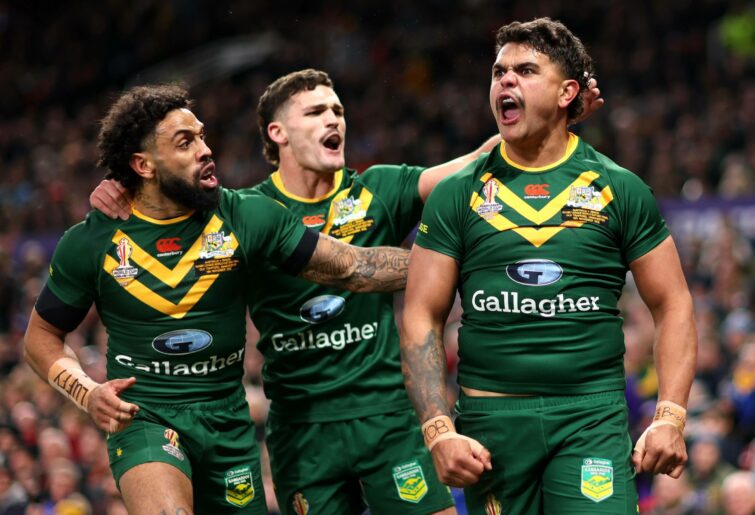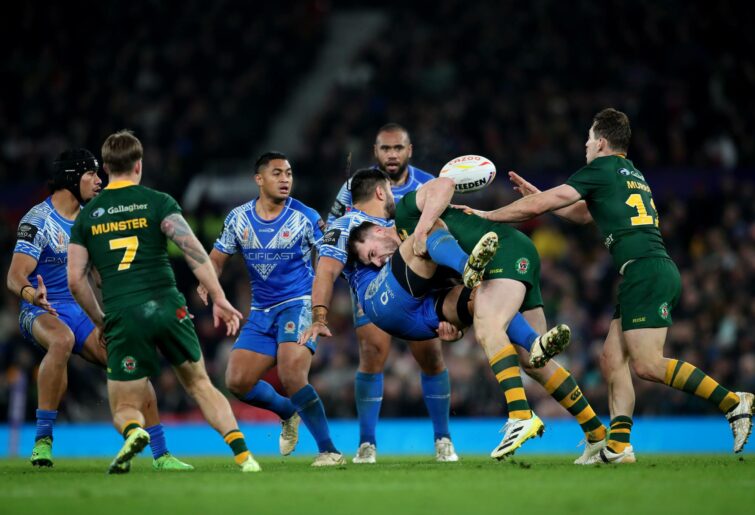The Rugby League World Cup has finished, and again Australia are crowned world champions.
Australia’s 30-10 victory against Samoa displayed the Kangaroos’ dominance over the 13-a-side version of the rugby code.
Now that the tournament has finished, was the World Cup a success? And where does the international game go from here?
Many variables need to be considered to answer the first question.
If the income generated was the sole deciding factor, then obviously not. The World Cup will be considered a disaster. It may be lucky to break even, but it is more likely to make a slight loss, and what is worse, the International Rugby League Federation was not flush with funds before the tournament.
In fact, due to COVID, the international governing body has not made a profit for many years. And when you consider that the International Rugby League was relying on earnings from the tournament to fund future growth, then the future for the sport is looking bleak. Hopefully, it will not be as ruinous as the 2000 World Cup.
The issue of crowds, or lack of them, at least until the final stages of the tournament, also presented the game in a negative light. This issue has been discussed among fans, but I still can’t figure out why sports organisers continually see their fans as cash cows rather than loyal clients.
I hope with the France World Cup in 2025 that tickets are priced to garner the highest possible attendance. And I don’t care if that means some tickets go for €5, whatever – just fill the stadiums and bring the atmosphere!
I understand that may mean making a profit all the more difficult, but at least it helps build a fanbase that may be able to assist in the future generation of profits. Having half-filled stadiums does not bring in the coin and does not bring an atmosphere that may hook a casual fan onto the sport.
The crowds and the income generation were not the only disappointments from the current tournament. What was clear was the groupings of the teams were not ideal.

(Photo by Naomi Baker/Getty Images)
Yes, it was fair, and the sport equally distributed the ability of the nations, but rugby league is not soccer. Having Australia compete against Scotland or Italy will never produce an exciting contest for fans.
The French World Cup can solve this problem. If the same nations made the next World Cup, I would create four ability-based groupings (with one favouring the hosts), and a modified knockout stage progression. For example, I would place the groups as follows:
Group A – Australia, New Zealand, England and Lebanon
Group B – Tonga, Samoa, Fiji and Papua New Guinea
Group C – Ireland, Wales, Italy and the Cook Islands
Group D – France, Jamaica, Greece and Scotland
The top three teams from Group A and Group B would progress to the quarter-finals. At the same time, only the winners of Group C and Group D would advance. Then in the quarterfinals, the winners of Group A and B would play the winners of Groups C and D.
Moreover, second place in Group A (and likewise for Group B) would play third place in the other group. Obviously, you could argue that France would probably make the quarters and then be knocked out… which is true, but at least they would make it further than they have in the last couple of World Cups.
This format generates closer contests and more games of higher intensity, which is a better outcome than what this World Cup produced.
Lastly, in terms of the nations that qualify, I hope the organisers drop at least one or two European positions and replace them with teams from the Americas. By doing so, they are allowing nations with more growth potential the chance to participate.
Not to knock the likes of Scotland, Ireland and Wales, but how much growth is possible with these countries? Soon, when the grandparent rule becomes obsolete, what systems are in place in Scotland to bring through the next crop of rugby league talent?
There may be a small amateur league in Scotland, but are there plans, funds, and interested parties that are going to grow the game in this nation? If there are, what are they?
And that should be the point of the international game – to grow the sport internationally.

(Photo by Jan Kruger/Getty Images for RLWC)
Before and after the next World Cup, I have zero ideas what is happening for the international calendar. Shockingly, it appears the game’s governing bodies are also in the dark. For a sport that wishes to be taken seriously on the international stage that is a joke.
Not only is it an own goal, but it provides a free kick to other sports that wish to denigrate the great game of rugby league. There are whispers of an Ashes tour – but when and where are not clarified. There are lessons that could be learned from this tournament that could help shape the future of the international rugby league.
What was evident is that the Pacific nations of Fiji, Tonga, Samoa and Papua New Guinea are far stronger than in previous years. A Pacific Six Nations also featuring Australia and New Zealand could create an Origin-style buzz every four years between World Cups in the southern hemisphere.
For example, a Pacific tournament in 2023, 2027, and 2031 could create competition consistency for these nations. At the same time, other regional tournaments could be held in Europe, the Americas, Africa and the rest of Asia-Pacific.
Notedly, these tournaments could also act as World Cup qualifiers. By doing so, the game is generating a meaningful and consistent international calendar. Once that is completed, then scheduling tours becomes the next priority. If regional tournaments occur in conjunction with World Cups, then it leaves two years free to allow possible tours.
But back to the World Cup: the crowds were generally not good, the tournament failed to bring the desired profits, and the contests in the group stages were, for the best part, not great events. What could not be doubted, however, was that the quality of play was fantastic.
As usual, the players bought in and produced. So, that is a win. Also, a win was the fact that the tournament was watched on television by many fans – especially in the United Kingdom. Maybe a different story in Australia, where interest in the international game is limited, but for a sport craving screen time, then the game (in England at least) got the shot in the arm it needed.
Despite these positive outcomes, the truth is that the 2021 Rugby League World Cup failed. It was not the success it could have or should have been. And to finish off, the legacy of the tournament remains unclear. Will the sports leaders finally administer the game to allow the international side of the sport to prosper? One can only hope.































































































